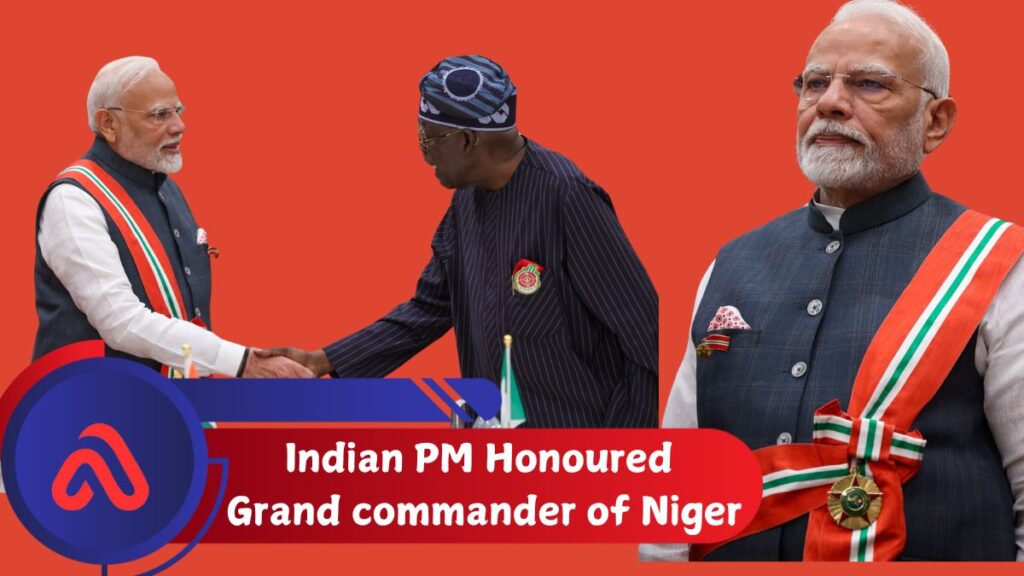The Event Overview
In a notable step toward strengthening ties between India and West Africa, Prime Minister Narendra Modi made a historic visit to Niger, where he was honored with the distinguished “Grand Command.” This visit marks a pivotal moment in India’s outreach efforts to bolster its presence in Africa, aligning with its larger diplomatic and strategic goals.
Understanding the Honor
The “Grand Command” is one of the highest national honors that Niger bestows on foreign dignitaries. Traditionally reserved for leaders whose contributions have significantly impacted Niger’s development or relations, this accolade underscores India’s increasing influence and commitment to cooperative ties in Africa. Receiving this honor points to India’s enhanced role as a partner in Niger’s development, especially in light of recent economic and infrastructural initiatives.
Why Was Modi Honored?
Niger’s decision to honor PM Modi could be attributed to several key factors:
- Developmental Aid: India has been actively involved in providing developmental assistance to Niger, supporting projects related to education, healthcare, and capacity building.
- Trade and Investment: India’s investment in Niger’s mining and energy sectors, particularly in uranium mining, is of strategic importance.
- Solidarity and Diplomacy: India’s approach to partnering with African nations on a platform of mutual growth, emphasizing “South-South Cooperation,” strengthens its diplomatic foothold and cements long-term partnerships.
Historical Context of India-Niger Relations
India and Niger have shared cordial relations over the decades, rooted in shared aspirations and historical engagements:
- Previous Engagements: Diplomatic ties date back to post-independence India, with cultural and political interactions solidified over various international platforms like the Non-Aligned Movement (NAM).
- Collaborative Projects: Key milestones include India’s participation in building infrastructure and providing technical assistance under the Indian Technical and Economic Cooperation (ITEC) program.
- India’s Role in Africa: Through the India-Africa Forum Summits and related outreach, India has developed relationships not just with Niger but across the continent, focusing on education, capacity building, and sustainable development.
The Importance of Niger to India
Niger’s significance to India can be analyzed through several lenses:
- Strategic Resources: Niger is among the world’s top producers of uranium, a crucial component for India’s expanding nuclear energy program. Ensuring access to such resources enhances India’s energy security.
- Geopolitical Positioning: Niger’s location in the Sahel region makes it a strategic partner in addressing regional security issues, including terrorism and political stability.
- Economic Collaboration: India has sought to diversify its trade portfolio, and partnering with resource-rich African nations like Niger facilitates this aim. Niger’s agricultural and mineral sectors provide opportunities for collaboration and investment.
India’s Strategic Goals and What It Wants to Achieve
PM Modi’s visit aligns with a larger strategic vision for India:
- Strengthening Bilateral Ties: By fostering a strong bilateral relationship, India positions itself as a partner of choice in West Africa, ahead of competitors like China and other global powers.
- Advancing Development Projects: New deals may include renewable energy initiatives, digital infrastructure development, and educational collaborations.
- Expanding Influence: This visit serves as part of India’s broader Africa strategy, showcasing its commitment to a multi-faceted partnership involving trade, technology transfer, and diplomatic support.
Historical Visits and Context
This visit can be contextualized by looking at previous diplomatic engagements:
- Past High-Level Visits: While this may be Modi’s first visit, India has hosted Nigerien officials and engaged with them at multilateral forums. Historical connections have also been forged through Indian peacekeeping missions in Africa under UN mandates.
- Development Partnerships: India’s commitment to Africa has been showcased in initiatives such as the Pan-African e-Network Project, which connects educational and medical institutions across the continent.
Why This Visit Now?
Timing is key in diplomacy. This visit comes at a time when:
- Shift in Global Politics: As nations reassess partnerships amid a shifting global order, India’s move is strategic to strengthen alliances in Africa.
- Competition with China: India’s proactive approach in Niger is likely a counterbalance to China’s significant presence and investments in Africa.
Concluding Analysis
PM Modi’s recognition by Niger highlights not just a diplomatic success but an affirmation of India’s growing influence in global south cooperation. The focus on mutual benefits, capacity building, and strategic resources aligns with India’s policy of building sustainable, long-term relationships. As India seeks to bolster its energy security, access new markets, and project its soft power, engagements like these play a crucial role in realizing its broader geopolitical ambitions.

